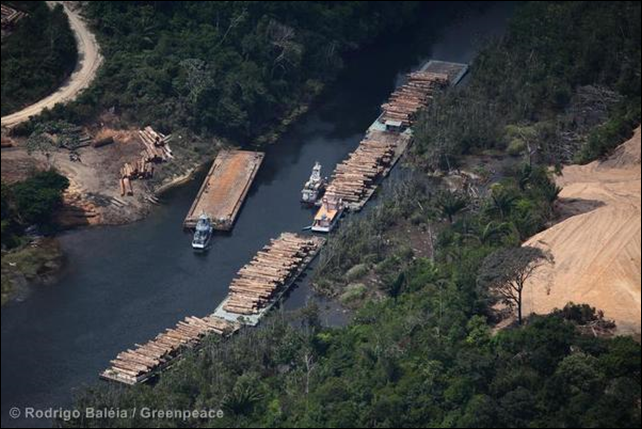Brazil laundering illegal timber on a massive and growing scale – ‘Logging in the Brazilian Amazon is absolutely out of control’
By Jonathan Watts and John Vidal
14 May 2014 (theguardian.com) – Illegally logged timber in Brazil is being laundered on a massive and growing scale and then sold on to unwitting buyers in the UK, US, Europe, and China, Greenpeace claimed on Thursday. After a two-year investigation, the environmental campaign group says it has uncovered evidence of systematic abuse and a flawed monitoring system that contradicts the Brazilian government’s claims to be coping with the problem of deforestation in the Amazon. In a report released on Thursday, Greenpeace cited five case studies of the fraudulent techniques used by the log launderers, including over-reporting the number and size of rare trees, logging trees protected by law, and over-extraction. It notes how forest management officials are implicated in the wrongdoing and several have previously been fined or detained for similar crimes in the past. Far more than half of the wood from the two biggest timber producing regions of Brazil probably comes from illegal sources, it says, citing figures from the Brazilian environmental research NGO, Imazon, that 78% of the wood shipped from the vast Amazonian state of Pará is illegally felled, while the figure is 54% in Mato Grosso. “Logging in the Brazilian Amazon is absolutely out of control. The current control system is being used to launder illegal timber,” said Marcio Astrini, a campaigner who was part of the two-year investigation. Widespread abuse of the current regulations for timber extraction allow illegal loggers to acquire dubiously obtained credits, according to environmental campaigners and federal prosecutors. With little oversight, big landowners obtain permission to cut down more trees than they intend to log and then sell on unused credits to lumber mills and other farmers. […] Logging is often the first step towards deforestation. The extraction of the most valuable trees, such as Apé, reduces canopy cover and opens up paths into the forest that are often later used to start fires for illegal land clearance. [more]
Brazil laundering illegal timber on a ‘massive and growing scale’ 
By Daniel Brindis
15 May 2014 (Greenpeace) – Amazon timber is all over the U.S. You can find it in hardwood flooring at national retailers like Lumber Liquidators and in walkways at landmarks like Atlantic City, Miami Beach, and the Brooklyn Bridge. Much of this wood comes from Pará State, Brazil’s largest timber producer and exporter. It is estimated that 78% of the timber logged in Pará is taken illegally. Just last month, I joined my Brazilian colleagues in Pará State to do some field research, speak with locals, and fly over some of the most threatened areas in the Amazon. The scale of the problem in the Brazilian Amazon is incredible. We witnessed logging trucks racing along dirt roads to remove trees for sawmills. And we spoke with many locals who confirmed that criminals throughout the state continue to buy and sell illegal timber with impunity. Controlling illegal logging is fundamental to saving the Amazon. Predatory logging sets the stage for deforestation in remote areas of the forest and threatens protected areas, including biological reserves and indigenous lands. Predatory logging threatens communities who depend upon and live in the forest. And it endangers animals like the jaguar. Meanwhile, it releases heavy amounts of climate pollution. Deforestation and forest degradation via logging is amongst the greatest contributors to climate change. Loggers particularly focus on the most valuable tree species like Ipe, which some have described as the next Mahogany. Ipe is very rare and fickle in terms of the conditions required for it to grow. A recent study concluded that it may be logged into extinction if things don’t change. Greenpeace’s recent investigation has documented the pervasive fraud and then tracked the fraud from tree to tabletop. Our team outlined common scams such as overestimating the number of valuable species in forests, falsifying information for chain of custody documents, and applying for logging permits in areas already deforested, all in order to sell timber of illegal origins with official documents. Criminals are easily able to generate the official documentation fraudulently and then use the documents to launder illegal wood. Importers of Amazon timber in the U.S. are part of the problem. Lumber Liquidators provides a striking example. One of the company’s suppliers, Pampa Exportacoes is connected to our case studies of forest crime and has been fined over 1 million USD in environmental fines. Furthermore, its sawmill suppliers have been fined roughly 79 million USD in environmental fines within the past five years. Finding that Lumber Liquidators is sourcing from tainted sources was not too surprising considering that Lumber Liquidators is already under investigation for importing illegal timber through Chinese factory suppliers in violation of the Lacey Act. You can send a message yourself to Lumber Liquidators to tell them to cut ties with forest criminals here.
Illegal timber from the Brazilian Amazon sold all over the world
